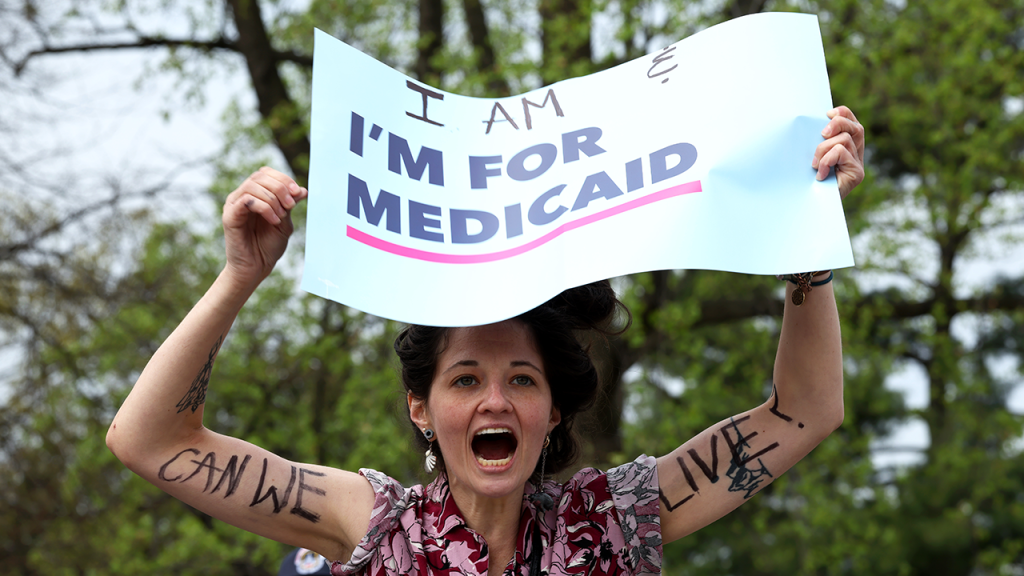The Democratic National Committee (DNC) has initiated a robust action plan titled “Fight to Save Medicaid,” aimed at rallying support against four vulnerable Republican representatives accused of planning significant cuts to Medicaid. This month-long campaign combines strategies like social media engagement and town hall meetings to galvanize public opinion and pressure these lawmakers to rethink their stances. As tensions mount, both Democrats and Republicans are preparing for intense political battles that could shape the future of Medicaid and impact upcoming elections.
| Article Subheadings |
|---|
| 1) Overview of DNC’s Campaign Initiative |
| 2) Republican Response to Medicaid Cuts |
| 3) The Strategy Behind the DNC’s Pressure Campaign |
| 4) Ongoing Political Tensions and Public Perception |
| 5) Future Implications for Medicaid and Elections |
Overview of DNC’s Campaign Initiative
The Democratic National Committee has launched a targeted initiative named “Fight to Save Medicaid,” which aims to safeguard the program from potential cuts by designated House Republicans. This campaign specifically focuses on four members: Mike Lawler from New York, Tom Barrett from Michigan, Don Bacon from Nebraska, and Brian Fitzpatrick from Pennsylvania. The DNC believes these representatives are particularly susceptible to pressure from their constituents, given their positions in the House. With Medicaid being a crucial service for millions of Americans, the DNC is seizing the moment to mobilize public support against any potential threats to this essential program.
Republican Response to Medicaid Cuts
The Republican representatives targeted by the DNC have responded assertively, labeling the Democratic campaign as a disingenuous effort aimed at misleading the public. For instance, Ciro Riccardi, a spokesperson for Rep. Mike Lawler, dismissed the DNC’s assertions and stated that “the dishonest Democrats should rename their campaign ‘the fight to save taxpayer-funded welfare benefits for illegal immigrants.’” Such comments highlight the tension between the parties, as Republicans accuse Democrats of resorting to “fear-mongering” to distract from their perceived failures. They assert their commitment to protecting Medicaid for vulnerable populations, arguing that their proposed reforms aim to enhance the program without compromising quality of care.
The Strategy Behind the DNC’s Pressure Campaign
The DNC’s campaign is multifaceted, incorporating digital activism, local community engagement, and direct action initiatives. Voters are encouraged to create “accountability content” on social media platforms, conduct “People’s Town Halls” in their representatives’ districts, and communicate their concerns directly through calls and emails. DNC Chair Ken Martin emphasized that the initiative’s objective is not only to hold these Republicans accountable but also to galvanize grassroots support for upcoming elections. By framing the issue as one of public welfare versus political expediency, the DNC hopes to sway constituencies that might otherwise be apathetic.
Ongoing Political Tensions and Public Perception
The ongoing dispute over Medicaid funding is illustrative of broader political tensions. For instance, recent events have shown that the DNC’s aggressive advertising strategy has led to pushback from the Republican side. The National Republican Campaign Committee (NRCC) recently compelled the DNC to retract several ads claiming that Republican representatives were planning cuts to Medicaid. The NRCC branded the advertisements as “defamatory,” thereby effectively curtailing the DNC’s momentum. This back-and-forth dynamic indicates that both parties are acutely aware of Medicaid’s significance as a political issue, as it has wide implications for public perception and voter sentiment.
Future Implications for Medicaid and Elections
The implications of this dispute extend beyond immediate legislative concerns and hint at the potential outcomes for the 2026 elections. If Democrats succeed in framing their opponents as antagonistic to Medicaid—one of the most critical social programs in the country—they could leverage this issue to reclaim more seats in Congress. Conversely, Republicans are attempting to solidify their positions by reassuring their constituents that Medicaid will not be vulnerable under their stewardship. With both sides preparing for an aggressive campaign season, the Medicaid debate will likely remain a focal point in American politics.
| No. | Key Points |
|---|---|
| 1 | The DNC has initiated a campaign to protect Medicaid, emphasizing the risks posed by certain House Republicans. |
| 2 | Republicans have dismissed the DNC’s efforts as disingenuous fear-mongering. |
| 3 | The DNC encourages grassroots activism, including social media campaigns and town halls. |
| 4 | Recent tensions illustrate the contentious nature of the Medicaid debate between Democrats and Republicans. |
| 5 | The Medicaid issue may significantly influence voter sentiment in the upcoming 2026 elections. |
Summary
The DNC’s “Fight to Save Medicaid” initiative highlights ongoing political tensions surrounding healthcare funding and the future of social programs in the United States. By focusing on vulnerable Republican representatives, the DNC is attempting to mobilize public opinion and leverage grassroots activism to safeguard Medicaid. Meanwhile, Republicans are vigorously defending their positions, framing the issue as a matter of integrity and service to constituents. As both parties gear up for future elections, the Medicaid debate will serve as a crucial battleground that could define their strategies and messaging in the lead-up to 2026.
Frequently Asked Questions
Question: What is the purpose of the DNC’s “Fight to Save Medicaid” campaign?
The campaign aims to protect Medicaid from proposed cuts by certain Republican representatives, mobilizing grassroots support to raise awareness and pressure lawmakers.
Question: How are Republican representatives responding to the DNC’s initiative?
Republicans are denouncing the DNC’s campaign as misleading and fear-mongering, asserting their commitment to maintaining and strengthening Medicaid services.
Question: Why is the Medicaid issue significant in upcoming elections?
Medicaid serves millions of Americans; framing the conversation around its protection or potential cuts could significantly influence voter sentiment and outcomes in elections.


